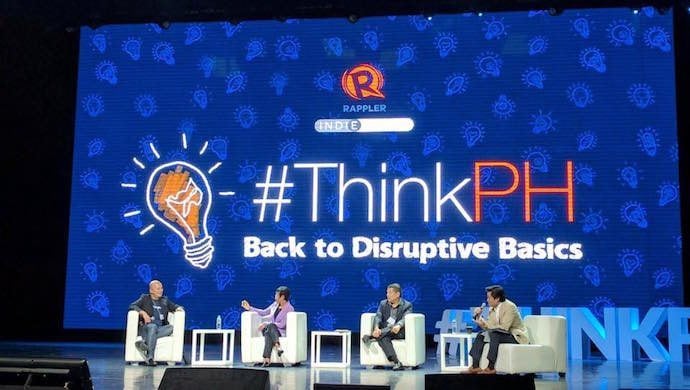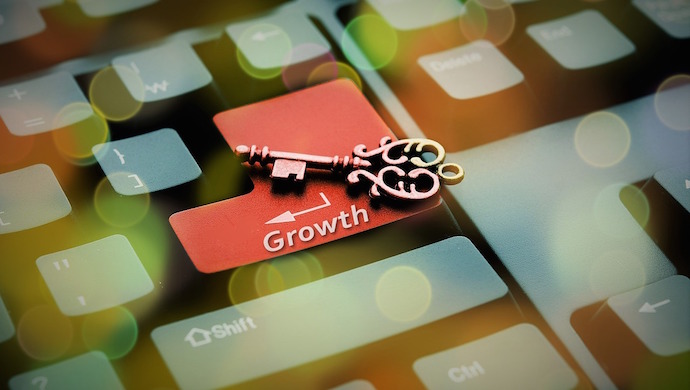It was ‘Back to Disruptive Basics’ at #ThinkPH, with discussions on finding one’s purpose and society’s evolution in today’s Information Age

Image Credit: Alex Alabiso
Philosophy. Sociology. Creativity – three elements highly unlikely to be discussed in a technology business conference and yet were key themes in describing the atmosphere and learning environment of Rappler’s #ThinkPH event. Held on July 21, #ThinkPH was a conference that challenged audiences to relearn new philosophies and unlearn outdated ones.
Asking deep philosophical questions about the role of technology and humanity in the near future, #ThinkPH gave its attendees an opportunity to find their purpose and rethink how they see their careers in such a digitally-disruptive ecosystem. e27 revisits these questions in this list:

What is the tsunami of ‘exponential technologies’ and who does it affect the most?
Yuri Van Geest, founder of Singularity University in the Netherlands, and co-author of Exponential Organizations, likens disruption to a tsunami – everyone initially dismisses the tsunami as a normal wave, until they notice the waves getting exponentially bigger.
“There’s a tsunami coming off exponential technologies that will disrupt our businesses and vertical markets.” Van Geest states. “And most organisations, just stay put; they are not able to disrupt their assumptions of the world until it’s too late.”
Because traditional companies often grow at a linear rate, they are then trumped by technologies that grow at an exponential rate. New emerging technologies are naturally classified as exponential technologies, such as deep learning, artificial intelligence, and quantum computing.
Similarly, Van Geest notes that exponential organisations emerge because they adapt to new organisational structures and employ techniques that leverage exponential technologies. As a result, the impact of exponential organisations is at least ten times as large as its industry peers.
“Are you able to let go and trust the machine, the robot, the algorithm, the AI? If not, you [will be] in trouble for the next five years.” Van Geest explains. “I disrupt myself daily. If I don’t, I’m outdated soon. That’s how I look at and experience the world.”

So how are big traditional companies faring today?
Mitch Locsin, VP and Head of PLDT SME Nation, admits that PLDT, an 88-year old company, was the most hit by the digital disruption. As the company relied heavily on a “talk and text design capability,” the shift of content to mobile apps hit the company hard.
Fortunately, Locsin states that PLDT is on the path on improving their current network and “becoming more data driven” as the disruption forced them to play catch up with its digital disruptors.
Likewise, Paolo Mercado, VP Marketing of Communication and Innovation in Nestle Philippines, notices how Nestle consumers react differently today with the help of social media. If a customer is unhappy with a Nestle product, Mercado explains, the customer would just take a picture and post it online, so Nestle needs to manage these complaints in a keener way.
The rise of social media usage in the Philippines has also led Mercado to ask himself,
“Do we want [Nestle products] to go beyond just an ad?”

How have people adapted in today’s Information Age?
As people are constantly surrounded with data, Simon Kemp, marketing strategist of WeAreSocial Singapore, reports a shift in the way we absorb ads.
“More than half of the world’s internet users have used ad-blocking tools. People don’t want to see our ads.” Kemp explains. “More than 70% of us also delete cookies so that websites won’t be able to remember us.”
Because ads have now become an interruption or a distraction to Internet users, Kemp warns audiences that if marketers don’t change up their strategies, ad-supported media will eventually disappear, and they won’t be able to advertise anymore.
“We have to find new ways to add value, not just new ways to deliver ads. Focus more on utility, and less on distraction.” Kemp advises.
He also notes how prescriptive analytics, using data to identify people’s needs and behaviours in advance, will be the new influence in society today.
“Future business success will depend on how well we can influence the algorithms.” Kemp states.

How has technology changed our industries locally and globally?
Aside from the growing popularity of messaging apps, chatbots, smart algorithms, and artificial intelligence are starting to grow just as fast in usability and popularity. As more users share more information on social media, this phenomenon also brings about rise of the shared economy.
In a fireside chat, Maria Ressa, founder and CEO of Rappler, unveiled RapRap, a Philippine-first news chatbot on Facebook Messenger that allows users to look and read for top stories and breaking news. Likewise, Paul Rivera, founder and CEO of Kalibrr, also uses smart algorithms similar to Netflix, automatically suggesting to users other jobs they can apply to.
In a very emotionally-charged story, Angelo Umali, founder and CEO of Simple Wearables also cites how his passion for technology and the love he had for his grandmother, led him to create his own wearable innovation, Simplewave.
Also Read: ‘Machine of Human Dream’s depicts lifelong dreams, and it’s inspiring to watch
However, on a local level, Nix Nolledo, founder and CEO of Xurpas, reminds audiences that the Philippines still needs to solve its local market challenges, one of which being the slow internet in the Philippines. Even Lazada cites how they’ve overcome several challenges in the country, using cash on delivery to gain customer trust, and communicating through mobile to spread market awareness.
As long as local limitations remain present, Filipino entrepreneurs and companies are challenged to think of more creative solutions and implement workarounds.
That said, big tech companies such as Facebook also offer solutions such as Free Basics and internet.org in order to address under-connected and the unconnected Filipinos.
On another front, Twitter and Google are also evolving their own platforms, with Twitter creating Twitter SEVA initially for the Indian government to respond to its citizens’ queries and concerns, and with Google banking on crowdsourcing with Google’s Local Guides and Google Map Maker.

Will robots and AI replace humanity one day?
From the perspectives of Peng Ong and Eric Cruz, the answer is both yes and no. Peng Ong, managing director of Monk’s Hill Ventures and founder of match.com, cites that in the next ten or even twenty years, machines will start taking over our jobs.
In one example, Ong cites how Uber has disrupted the transportation industry by making everyone a driver; however, what will happen when the self-driving cars becomes common? Will Uber start paying owners of self-driving cars?
“Things are going to change, and it’s not easy to comprehend what do you need to do about it.” Ong explains. “In about ten to twenty years time, you need to get a role that tell machines what to do instead of receiving instructions from machines.”
However, despite the machine-takeover, Ong says that this isn’t necessarily a bad thing. With society less focused on working, humans can start thinking deeply about their purpose in life.
“Instead of waiting for those decades to come…why don’t you take this opportunity with the time you have, to figure your purpose over there next few decades.” Ong describes. “That’s where thinking about technology is pretty fun, [it’s about] what you [want to] do and [how you can] change the world.”
Likewise Eric Cruz, executive creative director of AKQA Shanghai agrees. As technology continues to develop, Cruz explains, the “emergency of the creative CEO” is becoming more evident as well.
“Every CEO in every business now needs to be creative, to reinvent their business, [in order to] stay relevant and survive.” Cruz illustrates. “Creativity has gone beyond the ‘art department.’ Technology is forcing humanity to evolve, forcing creativity.”
Cruz also cites one example where artificial intelligence cannot beat society at, which is human empathy, the ability of human beings “to play, imagine, invent, and create.” Ultimately, Cruz cites how “creative intelligence” will be “the weapon of ‘mass disruption” in this new “post automation economy.”
In the end, #ThinkPH left a strong impression on its audiences with one simple question, “Are we ready for the upcoming digital tsunami?”
–
Photo Credit: Pixabay
The post Will robots and AI replace humanity one day? #ThinkPH takes a philosophical look into our digital future appeared first on e27.